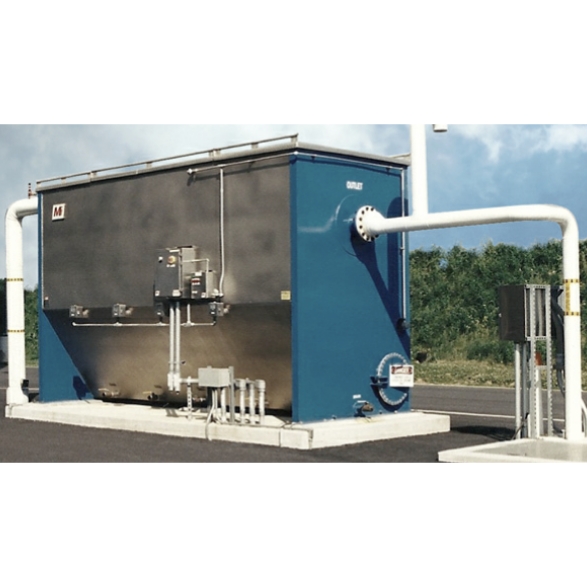Oil water separator is used in the oil and gas industry. It is used to separate oil and water. In this article, I will discuss all the important things related to oil water separator.

Table of Contents
Introduction Of Oil Water Separator
An oil-water separator is a crucial apparatus used to segregate oil and water mixtures into distinct constituents. The mechanism is utilized in various industries, and there exist numerous types of oil-water separators, each with a distinct oil separation capacity.
These separators are chosen after considering several factors, such as oil separation performance parameters and life cycle cost. The term “oil” includes different types of oils, such as mineral, vegetable, animal oils, and various hydrocarbons.
It is important to note that oil-water separators play a significant role in protecting the environment by preventing oil contamination in water bodies. The use of these separators is particularly critical in the oil and gas industry, where oil spills can have devastating ecological consequences.
Working Concept Of Oil Water Separator
An oil-water separator is a device designed to separate oil and other hydrocarbons from water, based on the principle of gravity separation utilizing the difference between the specific gravity of oil and water.
Typically, an oil-water separator consists of a tank or vessel that has two compartments, one for oil and the other for water. The contaminated water enters the first chamber through the inlet and buoyancy causes large oil droplets to rise to the surface, from where the oil is collected in a separate container.
The water then passes through a series of baffles or plates that slow down the flow of water, causing smaller droplets to merge into larger droplets. These larger droplets rise to the surface of the second chamber where they are collected. The filtered water flows out from the bottom of the second chamber.
In addition to gravity separation, oil-water separators can use filtration filters to enhance the separation process. These filters are used to separate small oil droplets into larger ones, which then float to the surface and are collected.
It should be keep in mind that oil-water separators are not completely effective at removing all traces of oil from water. There may be residual oil in the water that needs further treatment before it can be safely released into the environment.
Types Of Oil Water Separator
There are two types of oil water separator as mentioned below.
1. Gravity Oil Water Separator
Gravity separators rely on the difference in specific gravity between water and oils.
The contaminated water enters the separator through an inlet where a baffle reduces turbulence, allowing solids to settle to the bottom of the separator.
As the wastewater flows through the separator, oil droplets rise to the top but are prevented from exiting by a second baffle, while any remaining solids continue to settle.
Gravity separators are relatively simple and inexpensive to operate, making them a popular choice for many industrial applications.
However, they are less effective than coalescing separators when it comes to removing smaller oil droplets from wastewater.
2. Coalescing Oil Water Separator
Coalescing separators also rely on gravity separation, but with the addition of oleophilic media, which helps oil droplets bind together on the surface of the media.
This coalescence causes the oil droplets to become larger and more buoyant, rising to the surface more quickly and improving separation.
Coalescing separators are often used when the oil droplets are too small for efficient separation with a gravity separator.
They are generally more effective at removing oil and other contaminants from wastewater, but they are also more complex and expensive to operate.
FAQS
An oil water separator is a device that separates oil and other hydrocarbon liquids from water, usually through gravity or centrifugal force.
Oil water separators are important because they prevent oil and other hydrocarbons from polluting the environment, especially bodies of water.
Oil water separators are commonly used in industrial settings, such as oil refineries, manufacturing plants, and transportation facilities.
Oil water separators work by separating oil and other hydrocarbon liquids from water, using gravity or centrifugal force to separate the two substances.
There are several types of oil water separators, including gravity separators, coalescing separators, and centrifugal separators.
An oil water separator should be regularly inspected, cleaned, and maintained to ensure proper functioning. This may involve removing collected oil and sludge, checking for leaks, and replacing worn parts.
Using an oil water separator can help to reduce the environmental impact of industrial processes, prevent pollution of bodies of water, and reduce the risk of fines or penalties for non-compliance with regulations.
Oil water separators can be expensive to purchase and maintain, and they may require specialized knowledge or training to operate properly.
The effectiveness of an oil water separator depends on factors such as the type of separator, the concentration of oil in the water, and the operating conditions. In general, oil water separators can remove up to 95% of oil and other hydrocarbons from water.
There are some alternative methods for treating wastewater that contain oil and other hydrocarbons, such as biological treatment systems or chemical coagulation/flocculation. However, these methods may not be as effective or efficient as oil water separators in certain applications.
